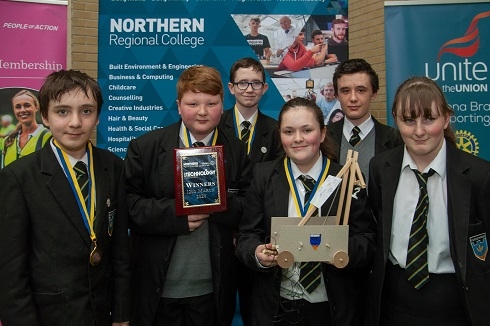Their solutions were tested and judged against each other, with the judges selecting the overall winning team and the runners-up, who received a prize of £100.
This year a team attending from Castle Tower School scooped the top prize, while the runners-up were from Ballymena. They were commended for their knowledge and application of Science, Technology, Engineering and Maths (STEM subjects) and their application in a real-world scenario.
All of the students who took part received formal certification from Sentinus, which will be added to their educational portfolio.
Engineering lecturer at Northern Regional College Mark Simpson, explained that the initiative is to promote a greater awareness of the importance of STEM subjects.
“Competing in the technology challenge is an excellent way for Year 10 pupils to explore STEM-related concepts as it encourages them to apply the underpinning theory in a fun and innovative way.
“We are delighted to host the Rotary Club Technology Challenge again and it allows us to welcome local schools to the campus to view our industry standard equipment and facilities in the Engineering and Built Environment Department,” Mark said.
The competition was a great opportunity for the College to engage with local post-primary pupils, particularly at a time when they are having to make decisions around future studies and career paths.
“At the end of this academic year, Year 10 pupils have to make some important choices about GCSE choices and this event will have been a success if some of them are encouraged to do STEM subjects,” he explained.
John Adams of the Rotary Club in Ballymena who, in conjunction with the College has been involved in the competition since its inception, outlined the judging process:
“The young people were given the same basic equipment to complete the challenge. They had to select a project manager and brainstorm possible solutions before submitting their proposed solution in writing alongside their practical element, culminating in a working solution. A portion of the overall marks were also awarded for how well the team engaged collectively throughout the task,” John explained.
Thanking the College and the business community for generously supporting the event, John said he was delighted that the Technology Challenge continues to go from strength to strength:
“Rotary Club’s partnership with the College has been a great success – we couldn’t have organised the event without their support. IT’s a great opportunity to support STEM subjects to young people and for our sponsors to see the facilities that are available in the College itself.”
The team of four competition judges were Jimmy Kelly, who has strong links with the College through his former training role at RLC Crumlin, Tom Keane from Sentinus, Jonathan Reilly representing Bank of Ireland and Rotary representative, and Ruth Walker, Engineering lecturer at Northern Regional College.
Ruth Walker said she took great encouragement from the participation of such a large number of females: “With the event falling so closely behind International Women’s Day it has been so encouraging to see such diversity in the competitors – particularly following the College’s recognition of Women in STEM earlier in the week.”
She added: “The College is heavily involved in the promotion of Women in STEM so I am delighted to see so many young women opting to take part in the Rotary Club Technology Challenge. It’s a great opportunity for them to get involved in STEM subjects and will hopefully inspire them to undertake some for GCSE.”
Jenny Small, Vice Principal for Performance and Development at Northern Regional College commended the event and the enthusiasm and holistic participation of the competing schools.
The event was sponsored by ASF Engineering, Ballymena Business Centre, Bank of Ireland, First Trust, Martin and Hamilton Construction, Michelin, Moore Concrete, Moy Park, RLC, Smiths, James Stevenson Quarries, Thermo King, Wilsons of Rathkenny and News Rack.
Northern Regional College offers a variety of full- and part-time STEM-based courses allowing students to progress from entrance level right up to Foundation Degree. These vocational courses focus on the practical and industrial application of STEM subjects and can help long-term employment prospects.


